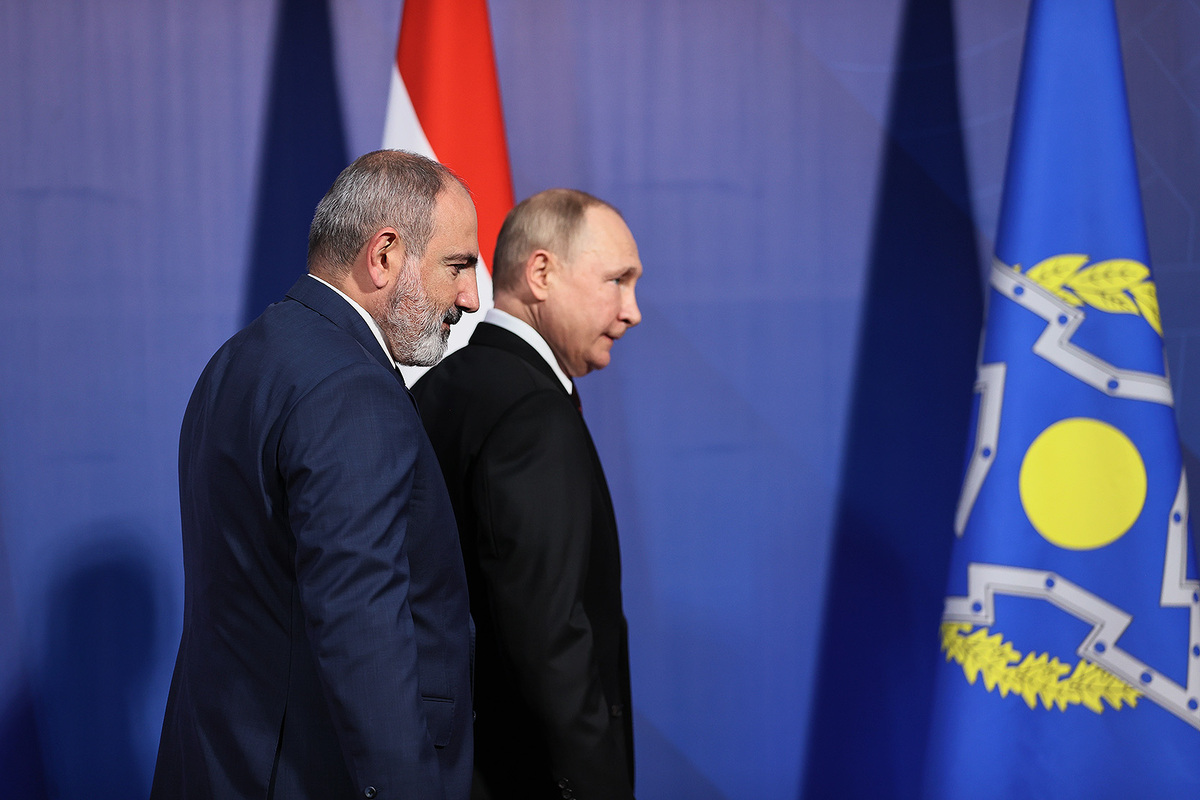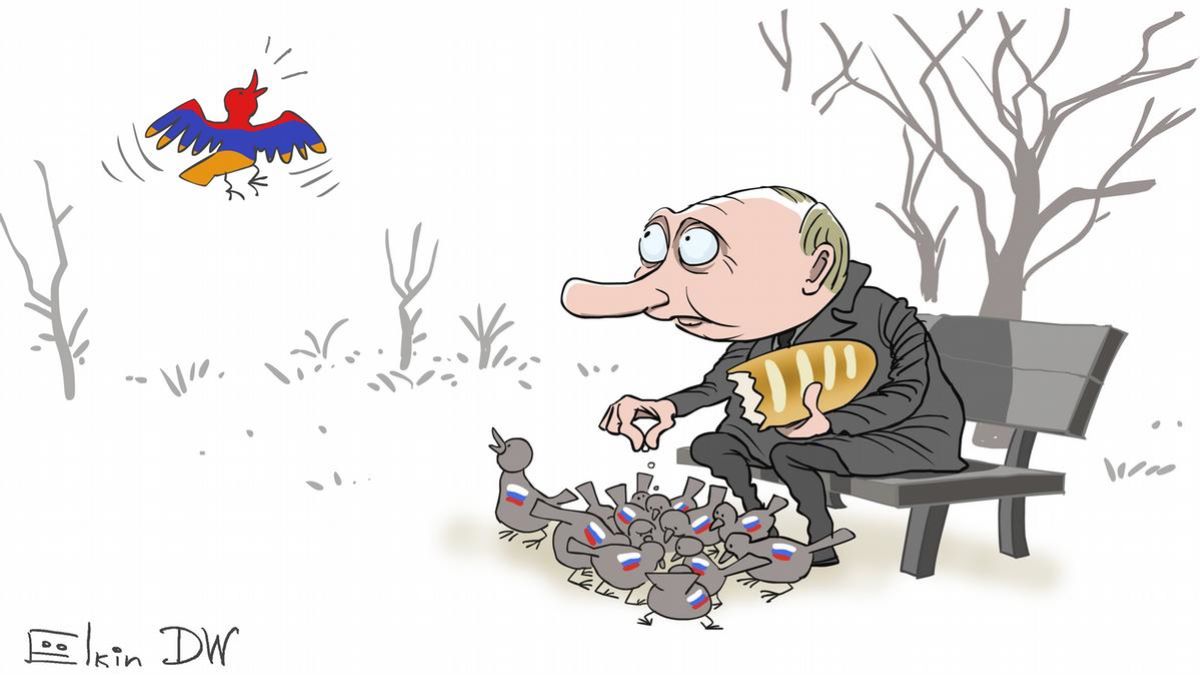"Putin won't offer Pashinyan anything, instead urging him to avoid aligning with the West." Expert opinions
Pashinyan-Putin meeting expectations
Armenia‘s prime minister Nikol Pashinyan has flown to Moscow for a working visit. On May 8th, he will preside over the meeting of the Supreme Eurasian Economic Council, marking the 10th anniversary of the signing of the Eurasian Economic Union Treaty. The Armenian prime minister did not attend Putin’s inauguration ceremony the day before, stating during his press conference that he “apparently didn’t receive an invitation” from Russia.
However, immediately following the Supreme Eurasian Economic Council meeting, a bilateral meeting between the leaders of Armenia and Russia is expected, likely late in the evening.
Armenian analysts speculate on what to expect from this meeting: will Armenia’s withdrawal from the Russian military bloc CSTO be discussed? What grievances might each side have? What new demands might Moscow make of Yerevan?
Here’s what we know about the agenda for the upcoming meeting, and the comments from Armenia.
- Pashinyan: ‘External forces want to provoke war in Armenia for the sake of a change of government’
- “Behind the movement against the borders demarcation – Russia and the 5th column of Armenia.” Opinion
- Why did Baku and Moscow recall the trilateral statement with Yerevan? Opinion
“Accumulated issues await discussion”
The previous meeting between Nikol Pashinyan and Vladimir Putin took place at the end of last year in St. Petersburg within the framework of the Supreme Eurasian Economic Council meeting.
Regarding the upcoming meeting, Yuri Ushakov, an aide to the Russian president, stated that there are many problematic issues to discuss in the relationship between Russia and Armenia:
“Pashinyan himself stated in April that relations with Moscow are going through difficult times. Recently, contacts between our countries at various levels have noticeably decreased. Criticism is voiced towards both Russia and the CSTO.
At the same time, Armenia is demonstratively engaging in dialogue with the West, including considering various options for joining the European Union and intensifying ties along NATO lines. So, there are now many issues that have accumulated and require discussion between the leaders.”
During his press conference the day before, the Armenian prime minister also touched on the meeting with the Russian President. Pashinyan confirmed that indeed, there are many problems, some of which have been raised by the Armenian side on multiple occasions:
“We have never held the view that these issues are raised just for the sake of being heard. They have been raised with the aim of eliminating negative aspects from the context of friendly relations between Armenia and Russia.“
Armenian authorities claim to have de facto frozen their membership in the CSTO. This is explained by the fact that the military bloc, of which Armenia is a member, does not declare a zone of its responsibility in Armenia and has refused to fulfill its obligations several times. This includes military aid requested by Yerevan following the invasion of Azerbaijani armed forces into the country’s territory. Their refusal within the CSTO was explained by the fact that the Armenian-Azerbaijani border is not demarcated, which prompted questions from Armenian authorities about the bloc’s area of responsibility.
Consequently, Yerevan is not participating in the activities of the structure, including joint military exercises. Nikol Pashinyan stated from the parliamentary podium that if this situation continues, Armenia will de jure freeze its participation in the Collective Security Treaty Organization.
Comments
Armenia and Russia’s leaders will discuss all pressing issues in the relationship between the two countries, but significant changes should not be expected from this meeting, says political analyst Tigran Grigoryan:
“Most likely, the main focus will be on economic issues. We see that amid the political crisis in Armenian-Russian relations, Armenian authorities are separating economic matters from the political agenda.”
Grigoryan believes that Ukraine is currently a priority for Moscow:
“I don’t think that in the South Caucasus, particularly in relations with Armenia at this stage, there will be any language of ultimatums.”
The political analyst also touched upon the possibility of Armenia’s withdrawal from the CSTO, a military bloc led by Russia. He noted that, “apparently, Yerevan is satisfied with the policy of de facto freezing” its participation in the organization:
“Formally, there may be an agenda for withdrawal from the CSTO, but I don’t see any factors capable of accelerating this process. There is no such demand from the West either.”
Putin will suggest to Pashinyan to abandon the intention of aligning with the West, offering nothing in return, believes political analyst Stepan Grigoryan.
The analyst believes that during the meeting, the question of Armenia’s withdrawal from the CSTO will definitely be discussed:
“And I can say what answer Pashinyan will get. He will be told that the CSTO is a very effective, very precisely working organization, and Armenia’s attempts to discredit the CSTO are in vain. They will say that the structure has a very clear position regarding Armenia’s borders. In the CSTO, they say: conduct demarcation and delimitation [of borders with Azerbaijan], then demand something from us. And Putin will repeat this.”
According to the political analyst, Pashinyan should directly express all grievances to the president of Russia. At the same time, the analyst is confident that both sides will stick to their positions, and nothing will change. He also believes that the Armenian authorities “are unlikely to dare to make a decision to withdraw from the CSTO after returning from Moscow.”




















